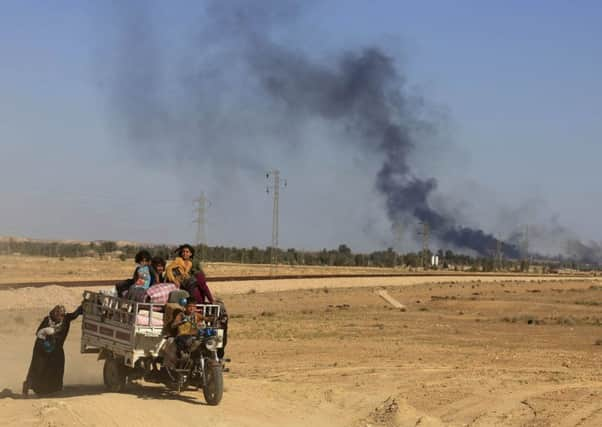Iraqi government forces prepare to battle for IS-held Mosul


Iraq’s government is setting its sight on Mosul, Iraq’s second largest city that has been under IS control since June 2014, as its next target in the fight against IS. The assault is likely months away, but fierce fighting has already been raging as Iraqi forces try to clear the militants from villages and towns south of the city.
The goal is to protect the Qayara air base, which was recaptured from the militants on 9 July and is to be a main hub for the final move on Mosul. Some 560 American military personnel, mainly engineers and logistics, security and communications experts, are due to deploy at the base to upgrade its facilities to prepare for the Mosul attacks, according to US Defence Secretary Ash Carter.
Advertisement
Hide AdAdvertisement
Hide AdBut that cannot happen yet because Qayara base has come under frequent rocket fire from IS fighters in the area. Around two-thirds of the surrounding towns and villages are controlled by IS fighters. Iraqi forces need to clear a 12-mile radius around the base and to retake the key nearby towns of Qayara and Shirqat.
Iraqi forces already have driven the Islamic State group out of the cities of Ramadi, Fallujah, Tikrit and Beiji west and north of the Iraqi capital, rolling back the jihadis’ dramatic blitz in the summer of 2014 that captured nearly a third of the country and linked with their territory in neighbouring Syria.
Retaking Mosul would be far more significant, robbing IS of the jewel of its self-declared caliphate. While the Syrian city of Raqqa is considered the caliphate’s de facto capital, Mosul is the largest city under its control, with a current population estimated at between 500,000 and 1 million. IS fighters in Mosul, meanwhile, vary from a few thousand to “not more than 10,000,” according to the coalition.
But the presence of hundreds of thousands of civilians in Mosul raises the prospect of a flood of people escaping – joining tens of thousands still displaced from previous fighting.
The Geneva-based International Committee of the Red Cross said on Friday that up to 1 million Iraqis could be forced to flee their homes in the coming weeks amid worsening fighting.
The group’s regional director for the Near and Middle East, Robert Mardini, said it is preparing for the worst, particularly in the Mosul area.
Already, a glimpse of the possible humanitarian crisis has emerged. Nearly 4,000 families have already fled their homes to escape ongoing fighting around the towns of Qayara and Shirqat. The government plans to house them in the town of Beiji to the south.
“The government is not prepared or equipped to deal with a humanitarian emergency,” said Hisham al-Hashimi, a prominent Iraqi analyst.
Advertisement
Hide AdAdvertisement
Hide AdThe civilians in the city also pose a challenge to Iraqi forces when they assault, said Ahmed Shawki, a retired Iraqi army colonel who is now a military analyst based in the Kurdish city of Irbil.
“Daesh will try its best to disappear among these people, in the civilian neighbourhoods of Mosul, to be safe from the airstrikes and hide from the eyes of the intelligence services,” he said, using the Arabic acronym for IS.
Iraqi officials have estimated that upgrading the Qayara base could take four to six weeks, once the area around it is secured.
Sean MacFarland, the top US commander in the fight against IS, said this month that the US personnel have already received warning orders to deploy and will flow in “relatively soon”.
The facility is believed to have been badly damaged by airstrikes since IS seized it in 2014.